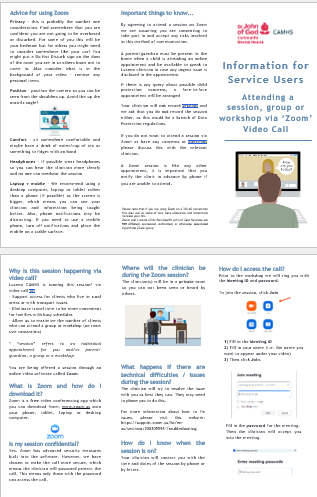Preparing your Young Person for their First Visit
 When you get your first appointment letter, it may be helpful to talk to your young person about what they might expect during their first visit to the clinic. Some young people may find it helpful to look at the website and read some information about the service. You can also show your child the video clips of the entrances to the clinic so that they know where they will be going.
When you get your first appointment letter, it may be helpful to talk to your young person about what they might expect during their first visit to the clinic. Some young people may find it helpful to look at the website and read some information about the service. You can also show your child the video clips of the entrances to the clinic so that they know where they will be going.
When you arrive in the clinic, you may be asked to check in at reception and to wait in the waiting room until the clinician comes to collect you.
At the first appointment, you and your young person may be seen by 1 or 2 clinicians. The first meeting usually lasts approximately 1.5 hours, but can be longer at times. Usually, the family and the clinicians meet together initially and if the young person is comfortable doing so, then often clinicians might meet with the young person and parents separately for a period of time. You can reassure your child that if they are not comfortable to separate, they do not have to and they are welcome to tell us this. If at any stage they require a break like a movement break, water or bathroom break this is no problem.
During the first meeting, a clinician will ask you about your current concerns and what is going well at the moment. Parents may be asked for information about their young person’s developmental history and their family’s health history. Your young person will be supported to tell their story in whatever way feels most comfortable to them.
Young people are welcome to bring their own sensory supports to the clinic. There are sensory support kits in every clinic room and they will be welcome to use their own items from home or use items from the kit.
If there is any information you feel may be helpful for us to know in advance, or any way we can support you and your young person, please do not hesitate to get in touch and let us know.
Accessing our Buildings
Here is some site information about all our different clinics, including transport routes and parking options. Please contact us if you or your young person require any specific accommodations when accessing the clinic.
Links to parent supports
Below are some links to organisations that work in Dublin and around Ireland to offer support for parents. For information on specific mental health challenges your young person may be experiencing, try our who do we support page.
- Parentline – Parent Line are a free to call helpline for parents and experienced with mothers and father experiencing thing like anxiety, addiction, sleep problems, and more.
- Barnardos – Barnardos work all across Ireland offering support, advice, and resources to families including parents, young people, and children.
- Family Resource Centre – Over 100 Family resource centres around Ireland work to families in their community.
- Jigsaw – Jigsaw work all around Ireland offering support to young people experiencing mental health difficulties and their parents.
- Pieta House – Pieta House work around Ireland offering supports for parents and young people around self-harm and suicide.


